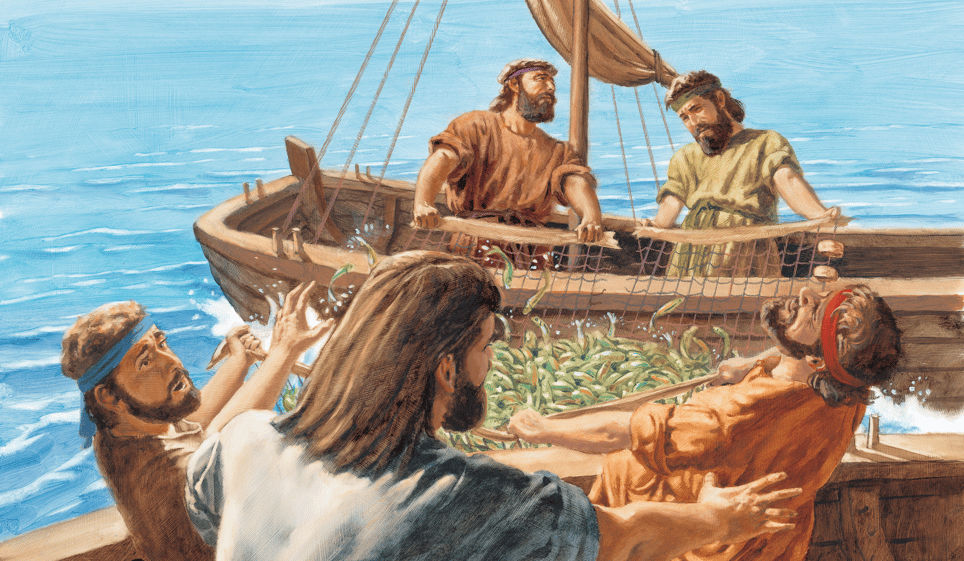In Luke 5, Christ preaches to the crowds and grants a miracle of fish to Simon Peter and his fellow fisherman. This great mass of fish was only a precursor to the great catch of the faithful that Christ has won for God through His Word and ministry.
Setting the SceneThe RMS Titanic, a British passenger ship making her maiden voyage from Southampton, England, to New York City, collided with an iceberg in the North Atlantic Ocean on April 15, 1912, sending hundreds of passengers into the icy water as the mighty ship sank. Incredibly, those rescued were charged $1 per word to send a message from the Carpathia, the boat that rescued them. One survivor used his last dollar to telegram the word safe to his family. The boats in the Gospel reading from Luke were sinking, too, but for a different reason.
At this point, Jesus has already gained such renown that large crowds constantly trail after Him. Jesus sees two boats. He enters one of the boats while its fishermen clean their nets. Even in a boat, Jesus preaches to those who follow Him. When Christ finishes teaching, He charges Simon Peter to row out and throw his nets into deeper waters. Although the request was dubious, given the lack of fish after a night of work, Simon Peter agrees. The result is a net so full of fish that the weight threatens to sink the boats.
Simon Peter is astonished and ashamed, falling at the Lord’s knees and saying, “Depart from me, for I am a sinful man, O Lord” (Luke 5:8). Jesus responds to Simon Peter and the other disciples, saying, “Do not be afraid; from now on you will be catching men” (Luke 5:10). He is pointing to their participation in His future ministry.
Mining the Gems
- Luke notes that the fishermen were washing their nets. While this detail seems extraneous at the outset, it points to the nature of Christ’s ministry of catching the lost. Net washing was a routine part of the fishing process. It involved removing remnant pieces of fish, underwater vegetation, and other refuse. Fishermen also stretched their nets to maintain flexibility for future use. Just as the nets are prepared for the catch, so are Christ and His disciples poised for the harvest.
- Luke notes that Jesus was seated in the boat. Aside from the added stability of being seated, people often taught from this position. Thus, Luke establishes that even in His body language, Christ comes to teach and save.
- Reacting to the Lord’s charge to put the nets into the deeper waters, Simon answers, “Master, we toiled all night and took nothing! But at Your word I will let down the nets” (Luke 5:5). Simon Peter and the other fishermen could not catch fish until the right time—when God willed it. Likewise, Simon Peter and the disciples would not reach the lost until called and empowered by the Lord. This verse reminds us of Jesus’ words in Mark 1:15: “The time is fulfilled, and the kingdom of God is at hand; repent and believe in the gospel.”
Law
- Luke 5:9 says, “For he and all who were with him were astonished at the catch of fish that they had taken.” The Greek translation reads, “for amazement seized him.” Understandably, amazement seized Simon Peter and the others. This brings up pertinent questions. What exactly was the nature of the amazement? Was it wonder or more akin to surprise? It certainly could have been both. If it were a surprise, this would mean that Simon Peter and the others did not consider Jesus capable of such a feat, that He was less than almighty God. We can surmise that Peter doubted Jesus, at least to some degree, as he answers the Lord’s bidding to put into the deeper water: “Master, we toiled all night and took nothing! But at Your word I will let down the nets.”
- We can also surmise from Peter’s words in verse 8, “Depart from me, for I am a sinful man, O Lord,” that he was surprised. Peter was convicted of his lack of faith and experienced shame before Jesus. All of us can relate. How often are we surprised when God answers our prayers? We pray for a job, and when the Lord delivers, amazement seizes us. When the Lord heals us from illness, we are not merely in appreciative wonder but shocked, either doubting God’s ability or interest in answering our prayer for healing.
Gospel
- Jesus’ words to Peter were a great comfort to him then, just as they are to us today: “Do not be afraid; from now on you will be catching men.” Our Lord not only offers Peter forgiveness for his lack of faith but confirms the disciple into this most important office. Yes, this is the Son of God, and awe is appropriate, but there is no need for fear. Jesus has come to calm our fears. We recall the angels’ message to the shepherds at the birth of Christ and the angels’ message to the women at the empty tomb: “Do not fear.” We can be at peace in the presence of God because He has assuaged His just anger toward sinners at the expense of His own Son, Jesus Christ.
- Jesus called men to catch men so they would come to know the love of God in His Son, our Redeemer. The Holy Spirit continues in this mission today, using Word and Sacrament to call sinners out of the darkness and into His marvelous light. Each day, the salvific net of the Gospel message and Holy Baptism is cast out, never to return empty.
Scripture: ESV®.
 Learn more about Christ’s ministry in Luke’s Gospel with this Concordia Commentary!
Learn more about Christ’s ministry in Luke’s Gospel with this Concordia Commentary!













